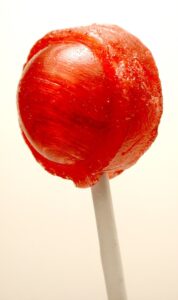 At least for today, I’m hitting the school news pause button. It’s all become quite political, so, this time around, I’m turning to history. Not the read the chapter and answer the the-end-of chapter questions kind but history that reminds us of the wonder of things and how they came to be.
At least for today, I’m hitting the school news pause button. It’s all become quite political, so, this time around, I’m turning to history. Not the read the chapter and answer the the-end-of chapter questions kind but history that reminds us of the wonder of things and how they came to be.
Was initially thinking to go with pencils with attached erasers, then toilet paper, but no. Today, it’s gonna be lollipops, not only because I’m a candyholic and have a kitchen drawer dedicated to the goodies, but since it’s one of my all-time favorite words. I love how it rolls around in the mouth…
And so…
“Suckers” apparently got their start with our cave-dwelling ancestors. Really. Using sticks, they went about collecting honey from beehives, and then licked it off, or so the story goes.
Fast forward to 17th century England where folks wisely started inserting sticks into soft candy treats to make them easier to eat.
Now jump way ahead to 1905 and the McAviney Candy Company in Hartford, Connecticut where they boiled their hard candies, stirring the mix with a stick. At day’s end, the owner used to bring the used, candy-covered sticks home to his delighted kids. Three years later he started selling his candy-on-a-stick, but the story doesn’t end there.
Credit for the modern lollipop actually goes to confectioner George Smith and his candy-making Bradley Smith Company. He got started making the sweets in 1908 and named them “Lolly Pops,” after, of all things, a racehorse! Right away, he applied to trademark the name, but it didn’t become official until 1931.
Meanwhile, because Smith’s treats became so popular, he created and patented a machine that automated the process, thus speeding up the whole process. He sold each for just one penny.
Then around 1912, Russian immigrant Samuel Born got into the business with his Born Sucker Machine in California. By automatically inserting sticks into hard candy, it revolutionized lollipop making. (Know any born suckers?)
And get this: According to linguists, in old England the word for tongue was “lolly” and for slap, it was “pop,” hence tongue slapper!
With thanks and happiness wishes, Carol
Very interesting how lollipops evolved, and right about now sounds delicious 😋
Thank you!